 Law Society of Scotland’s complaints whitewash provoked reforms. THE CANCELLED PROSECUTION OF BORDERS LAWYER ANDREW PENMAN, of Stormonth Darling Solicitors, by the Law Society of Scotland was one of the prime factors in starting a Scotland wide campaign to reform regulation of the legal profession, after the release of the investigation documents which revealed a Law Society Complaints Committee had been bullied into changing an original decision to prosecute Andrew Penman by Penman’s secret representative who attended the hearing, James Ness, a senior Law Society figure, now Deputy Director of Professional Practice.
Law Society of Scotland’s complaints whitewash provoked reforms. THE CANCELLED PROSECUTION OF BORDERS LAWYER ANDREW PENMAN, of Stormonth Darling Solicitors, by the Law Society of Scotland was one of the prime factors in starting a Scotland wide campaign to reform regulation of the legal profession, after the release of the investigation documents which revealed a Law Society Complaints Committee had been bullied into changing an original decision to prosecute Andrew Penman by Penman’s secret representative who attended the hearing, James Ness, a senior Law Society figure, now Deputy Director of Professional Practice.
 Scotsman newspaper in better days followed the Penman case, eventually leading to its own editorials calling for self regulation of lawyers to end. As a result of significant publicity in the Scotsman newspaper on the Andrew Penman investigation, further cases came to light where it transpired many solicitors facing serious complaints had been legally represented at Law Society Complaints Committee hearings, particularly on serious issues such as embezzlement, allegations of client fraud, almost all complaints regarding the handling of wills, and even in cases where clients had been convicted of criminal charges. In all of these cases, while solicitors had been represented before Complaints Committees, clients had been denied equivalent representation.
Scotsman newspaper in better days followed the Penman case, eventually leading to its own editorials calling for self regulation of lawyers to end. As a result of significant publicity in the Scotsman newspaper on the Andrew Penman investigation, further cases came to light where it transpired many solicitors facing serious complaints had been legally represented at Law Society Complaints Committee hearings, particularly on serious issues such as embezzlement, allegations of client fraud, almost all complaints regarding the handling of wills, and even in cases where clients had been convicted of criminal charges. In all of these cases, while solicitors had been represented before Complaints Committees, clients had been denied equivalent representation.
Indeed, the practice of ‘legally’ representing a solicitor in front of a Complaints Committee, had become so common, it became accepted practice, unquestioned by any solicitor or lay members of the Complaints Committees, although deemed so sensitive the policy was kept secret from complaining clients and the general public, fearing claims of unfairness & prejudice. That secrecy broke, however, when due to the publicity on the Penman case, the Law Society was forced to disclose most of the Committee’s deliberations on Andrew Penman, sparking many clients to eventually find out they too had been similarly maligned by a hugely prejudicial policy of allowing a crooked lawyer legal representation before a Complaints Committee, while denying the same right to members of the public.
 Former Legal Services Ombudsman Garry Watson changed recommendations on Law Society orders. As publicity grew around the Penman case, the practice of lawyers being legally represented before Complaints Committees, and being allowed to submit personal letters of pleadings to Committee members, while clients were denied similar rights, was criticised by the then Scottish Legal Services Ombudsman, Garry S Watson, who recommended the Law Society halt the practice, which it did, for a few months, until the publicity died down, then apparently re-started in secret. Garry Watson also asked for full explanations and disclosure over Penman’s secret representations, which never happened after the Law Society ordered Mr Watson to change his opinion, cancelling his order clients should be informed fully of Committee deliberations. After the Law Society restarted the practice, clients were of course none the wiser as queues of lawyers lined up to send their legal representatives to Complaints Committees, pleading in the first instance, threatening legal action and judicial reviews against Committee decisions if the former did not work.
Former Legal Services Ombudsman Garry Watson changed recommendations on Law Society orders. As publicity grew around the Penman case, the practice of lawyers being legally represented before Complaints Committees, and being allowed to submit personal letters of pleadings to Committee members, while clients were denied similar rights, was criticised by the then Scottish Legal Services Ombudsman, Garry S Watson, who recommended the Law Society halt the practice, which it did, for a few months, until the publicity died down, then apparently re-started in secret. Garry Watson also asked for full explanations and disclosure over Penman’s secret representations, which never happened after the Law Society ordered Mr Watson to change his opinion, cancelling his order clients should be informed fully of Committee deliberations. After the Law Society restarted the practice, clients were of course none the wiser as queues of lawyers lined up to send their legal representatives to Complaints Committees, pleading in the first instance, threatening legal action and judicial reviews against Committee decisions if the former did not work.
 Law Society’s reversal of prosecution helped bring consumer led reforms to regulation of lawyers. The Andrew Penman case, which clearly should have went to the Scottish Solicitors Discipline Tribunal as a prosecution, with Mr Penman being struck off, but did not, through the Law Society’s determination to “Save Private Penman” as some have said over the years, did bring gains to consumers in terms of revealing the thoroughly corrupt practices of self regulation carried out by the Law Society of Scotland, and its will to keep such practices secret, and of course, long lasting until even the present day.
Law Society’s reversal of prosecution helped bring consumer led reforms to regulation of lawyers. The Andrew Penman case, which clearly should have went to the Scottish Solicitors Discipline Tribunal as a prosecution, with Mr Penman being struck off, but did not, through the Law Society’s determination to “Save Private Penman” as some have said over the years, did bring gains to consumers in terms of revealing the thoroughly corrupt practices of self regulation carried out by the Law Society of Scotland, and its will to keep such practices secret, and of course, long lasting until even the present day.
 Douglas Mill, brought down by his anti-client memos, and relentless policies to save crooked lawyer Andrew Penman from prosecution. ‘Saving Private Penman” helped bring two [costly] Scottish Parliamentary inquiries into regulation of the legal profession, the first one Chaired by Christine Grahame (a dud – the enquiry, I refer to, of course) and the second, chaired by David Davidson MSP, which after hearing of even more revelations of secret anti-client behaviour such as the Douglas Mill ‘memo’gate affair’, brought to light by the now Cabinet Chief John Swinney, resulted in the passage of the Legal Profession & Legal Aid (Scotland) Act 2007, which created the hapless and Law Society controlled Scottish Legal Complaints Commission, which would have been good, had perhaps someone such as John Swinney managed its formation process, instead of the hapless Justice Secretary Kenny MacAskill, who simply allowed the Law Society to pull all the strings, and fill the SLCC with a slew of Pinnochios whose noses stretch from here to the planet Pluto.
Douglas Mill, brought down by his anti-client memos, and relentless policies to save crooked lawyer Andrew Penman from prosecution. ‘Saving Private Penman” helped bring two [costly] Scottish Parliamentary inquiries into regulation of the legal profession, the first one Chaired by Christine Grahame (a dud – the enquiry, I refer to, of course) and the second, chaired by David Davidson MSP, which after hearing of even more revelations of secret anti-client behaviour such as the Douglas Mill ‘memo’gate affair’, brought to light by the now Cabinet Chief John Swinney, resulted in the passage of the Legal Profession & Legal Aid (Scotland) Act 2007, which created the hapless and Law Society controlled Scottish Legal Complaints Commission, which would have been good, had perhaps someone such as John Swinney managed its formation process, instead of the hapless Justice Secretary Kenny MacAskill, who simply allowed the Law Society to pull all the strings, and fill the SLCC with a slew of Pinnochios whose noses stretch from here to the planet Pluto.
 Law Society covered up details of decision not to prosecute Andrew Penman. The failure to prosecute Andrew Penman for offences which many solicitors since have been prosecuted and even struck off for, some even sent to jail such as ex solicitor Michael Karus, still reverberates around the legal profession, and has given clients the strength to complain against many a crooked lawyer – a good thing. Penman has also shed a much needed light on the very secretive nature of Scotland’s legal profession and how the Law Society of Scotland controls, or denies access to justice to anyone it so feels like intimidating. Again, another plus, if a costly one to Scotland, as generally one can conclude, the Scottish legal profession are not a very trustworthy bunch, either in legal service to their clients, or when it comes to regulating their own colleagues.
Law Society covered up details of decision not to prosecute Andrew Penman. The failure to prosecute Andrew Penman for offences which many solicitors since have been prosecuted and even struck off for, some even sent to jail such as ex solicitor Michael Karus, still reverberates around the legal profession, and has given clients the strength to complain against many a crooked lawyer – a good thing. Penman has also shed a much needed light on the very secretive nature of Scotland’s legal profession and how the Law Society of Scotland controls, or denies access to justice to anyone it so feels like intimidating. Again, another plus, if a costly one to Scotland, as generally one can conclude, the Scottish legal profession are not a very trustworthy bunch, either in legal service to their clients, or when it comes to regulating their own colleagues.
Here, at the request of several law students who are studying ‘regulation’ of the legal profession in Scotland, is the full report on Borders Solicitor Andrew Penman of Stormonth Darling Solicitors, Kelso. I would certainly not recommend anyone use that law firm, as reading the following will reveal.
 Law Society investigating lawyer found that Andrew Penman had tried to fake the files. The Law Society report said : “The reporter had found it extremely difficult to obtain from the file a clear picture of what had taken place in the executry. The files had not been well kept and it was noted that throughout the files there were correspondence and telephone notes which were not in chronological order. It was noted that at several points there was correspondence which appeared not to have been dealt with and not to have been put on file as it was received but to have been put on at a later date. The reporter noted a number of’ instances which suggested that correspondence had simply been accumulated off the file and then dealt with in a fevered bout of activity in order to deal with matters which had long been delayed. The reporter noted there was also evidence of what appeared to be a bungled and unsuccessful attempt to put the file into order. Correspondence of July 1990 and July 1991 had been put on the file at a point which clearly related to July 1992.“
Law Society investigating lawyer found that Andrew Penman had tried to fake the files. The Law Society report said : “The reporter had found it extremely difficult to obtain from the file a clear picture of what had taken place in the executry. The files had not been well kept and it was noted that throughout the files there were correspondence and telephone notes which were not in chronological order. It was noted that at several points there was correspondence which appeared not to have been dealt with and not to have been put on file as it was received but to have been put on at a later date. The reporter noted a number of’ instances which suggested that correspondence had simply been accumulated off the file and then dealt with in a fevered bout of activity in order to deal with matters which had long been delayed. The reporter noted there was also evidence of what appeared to be a bungled and unsuccessful attempt to put the file into order. Correspondence of July 1990 and July 1991 had been put on the file at a point which clearly related to July 1992.“
“The reporter noted that the files disclosed numerous lengthy and unexplained delays and a repeated failure to respond to correspondence. There were dozens of letters on the files apologizing to third parties for delays in dealing with executry matters. These delays in many cases amounted to several months and in the case of the capital taxes office there were several delays, one of 18 months.”
 Law Society investigating lawyer found Andrew Penman deliberately mislead the Royal Bank of Scotland, amounting to professional misconduct. Page two of the Law Society report said : “The reporter noted there was a complete failure on the part of Messrs. P. & J. Stormonth-Darling to deal with this matter. They completely failed to acknowledge the instructions they had received from the Royal Bank in this connection and failed to take any steps to deal with the matter. The reporter was of the view that the substantial and unnecessary delays which had taken place in the executry might amount not only to an inadequate professional service on the part of Messrs. P.& J. Stormonth Darling but professional misconduct on the part of Mr Penman the solicitor dealing with the matter up until the time the complaint was lodged with the Law Society on 17th October 1994. Further the reporter was of the view that the apparent deliberate attempt to mislead the Royal Bank in regard to the Banco di Roma account may amount to professional misconduct.”
Law Society investigating lawyer found Andrew Penman deliberately mislead the Royal Bank of Scotland, amounting to professional misconduct. Page two of the Law Society report said : “The reporter noted there was a complete failure on the part of Messrs. P. & J. Stormonth-Darling to deal with this matter. They completely failed to acknowledge the instructions they had received from the Royal Bank in this connection and failed to take any steps to deal with the matter. The reporter was of the view that the substantial and unnecessary delays which had taken place in the executry might amount not only to an inadequate professional service on the part of Messrs. P.& J. Stormonth Darling but professional misconduct on the part of Mr Penman the solicitor dealing with the matter up until the time the complaint was lodged with the Law Society on 17th October 1994. Further the reporter was of the view that the apparent deliberate attempt to mislead the Royal Bank in regard to the Banco di Roma account may amount to professional misconduct.”
The Law Society investigating lawyer went onto demand a prosecution of Andrew Penman, saying : “In respect of the extraordinary delays and the repeated failures to respond to correspondence and the apparent, deliberate attempt to mislead the Royal Bank the reporter was of the view that the professional misconduct was such that it would warrant prosecution before the Scottish Solicitors Discipline Tribunal The reporter was or the view that there had clearly been an inadequate professional service but in the, event of a referral to the Scottish Solicitors Discipline Tribunal this would be incorporated into the complaint.”
 Law Society Complaints Committee said Andrew Penman mislead the Royal Bank, was a failure at handling an executry. The Committee’s consideration of the investigating lawyer’s findings revealed : “The Committee expressed grave concern at the way that this executry had been handled by Mr. Penman and the extraordinary delays and the complete failure to deal with correspondence in an adequate manner, The Committee were of the: view that there: had been very poor attention paid to the administration of this estate and that whilst the complainer’s uncertainty in certain matters might have caused some confusion there was a general lack of effort on the part of the solicitors to deal with matters in a reasonable manner.. It was noted in connection with the proposed loan by the Royal Bank. to the complainer there was a complete and utter failure to deal with the matter in any way or even to acknowledge the instructions. In connection with the Banco di Roma account the Committee noted the failure on the part of Mr. Penman to deal with matters in a reasonable way. They were particularly concerned at the terms of the letter written by Mr. Penman to the Royal Bank on 29th September 1992 which appeared to be an attempt to mislead the Royal Bank into believing that matters were being actively dealt with when they were not.”
Law Society Complaints Committee said Andrew Penman mislead the Royal Bank, was a failure at handling an executry. The Committee’s consideration of the investigating lawyer’s findings revealed : “The Committee expressed grave concern at the way that this executry had been handled by Mr. Penman and the extraordinary delays and the complete failure to deal with correspondence in an adequate manner, The Committee were of the: view that there: had been very poor attention paid to the administration of this estate and that whilst the complainer’s uncertainty in certain matters might have caused some confusion there was a general lack of effort on the part of the solicitors to deal with matters in a reasonable manner.. It was noted in connection with the proposed loan by the Royal Bank. to the complainer there was a complete and utter failure to deal with the matter in any way or even to acknowledge the instructions. In connection with the Banco di Roma account the Committee noted the failure on the part of Mr. Penman to deal with matters in a reasonable way. They were particularly concerned at the terms of the letter written by Mr. Penman to the Royal Bank on 29th September 1992 which appeared to be an attempt to mislead the Royal Bank into believing that matters were being actively dealt with when they were not.”
“The Committee concurred with the views of the reporter in this matter indicating that the apparent attempt to mislead the Royal Bank persuaded them that Mr Penman’s acting in the matter were so serious and reprehensible as to amount to professional misconduct.”
“The Committee thereafter considered whether the professional misconduct was such that it would warrant referral to the Scottish Solicitors Discipline Tribunal. The Committee were of the view that the administration of the executry had been so appallingly badly done as to take the issue out of service into that of conduct and coupled with the apparent attempt to mislead the Royal Bank the conduct was such that it would warrant prosecution before the Scottish Solicitors Discipline Tribunal. “
Law Society Complaints Committee decided that Andrew Penman should be prosecuted : “The Committee were of the view that Mr, Penman’s acting in respect of the extra-ordinary delays and failure to progress the administration of the executry and in apparently misleading the Royal Bank of Scotland were so serious and reprehensible as to amount to professional misconduct. The Committee determined to recommend to Council that Mr. Penman be prosecuted before the Scottish Solicitors Discipline Tribunal in relation to the professional misconduct and the service provided and any other matter which the Fiscal feels appropriate.”
 Andrew Penman begged the Complaints Committee not to prosecute, citing personal humiliation in the media as an excuse, while his legal representative at the Committee, Mr James Ness used his influence among the Committee members to derail the decision to prosecute : “Written representations were then made as to why Mr Penman should not be prosecuted. It was pointed out that the action of the complainer in referring matters to the media prior to the complaint being considered Mr Penman’s natural right to have the Tribunal or the Society decide whether the case was deemed fit for publicity had been denied. As a result of the complaint, and newspaper report Mr Penman had suffered personally and this had been a considerable punishment in itself. It was argued that a reference to the Tribunal would result in a fine and substantial cost to Mr Penman with little or no purpose beyond what the Society could achieve using its own powers given that the Society would be able to order a waiver of part or all of the substantial fee which could be charged for work done together with a compensation award of up to £1,000.00.”
Andrew Penman begged the Complaints Committee not to prosecute, citing personal humiliation in the media as an excuse, while his legal representative at the Committee, Mr James Ness used his influence among the Committee members to derail the decision to prosecute : “Written representations were then made as to why Mr Penman should not be prosecuted. It was pointed out that the action of the complainer in referring matters to the media prior to the complaint being considered Mr Penman’s natural right to have the Tribunal or the Society decide whether the case was deemed fit for publicity had been denied. As a result of the complaint, and newspaper report Mr Penman had suffered personally and this had been a considerable punishment in itself. It was argued that a reference to the Tribunal would result in a fine and substantial cost to Mr Penman with little or no purpose beyond what the Society could achieve using its own powers given that the Society would be able to order a waiver of part or all of the substantial fee which could be charged for work done together with a compensation award of up to £1,000.00.”
A variety of further excuses were presented by Andrew Penman, through his legal agent Mr Ness, which persuaded the Committee not to prosecute, : “It was also pointed out that the complaint was from a beneficiary and not from the executor in the estate with whom Mr Penman had been working to resolve matters. The Committee considered the representations which had been made. The Committee were of the view that Mr Penman’s dealings with the matter undoubtedly amounted to professional misconduct. They thereafter considered whether in light of the representations which had been made the scale of the misconduct could be said to be so serious as to justify prosecution or whether a reprimand would be more appropriate. The Committee noted that Mr Penman clearly accepted that matters had not been dealt with in a proper manner by him and that there had been delays in progressing matters.”
The Complaints Committee, arm-twisted by senior Law Society official James Ness, and lacking any equivalent representation for my points, then changed their verdict to save Mr Penman so he could ruin some more unsuspecting clients : “Having re-considered the matter and taking into account the representations which had been made the Committee were unanimously of the view that whilst Mr Penman’s acting amounted to professional misconduct they were not such that would warrant a prosecution and a reprimand would be more appropriate. The Committee therefore determined to withdraw their recommendation for prosecution and to substitute a provisional finding of professional misconduct warranting a reprimand.”
 Complaints Committee accused Andrew Penman of Professional Misconduct, and did nothing after Law Society intervention. The Complaints Committee in the lead up to their decision, began to excuse their change of mind over prosecution, stating : “It was noted that written representations had been received from the complainer dated 5th and 20th July. Representations had been received from Messrs. P & J Stormonth Darling dated 25th July and the Committee Secretary advised that Mr Penman had confirmed that he accepted the Committee’s preliminary view on matters i.e. that he be reprimanded in respect of the professional misconduct. Having considered the written representations the Committee found no reason to depart from its previous view and, therefore, confirmed their previous findings.”
Complaints Committee accused Andrew Penman of Professional Misconduct, and did nothing after Law Society intervention. The Complaints Committee in the lead up to their decision, began to excuse their change of mind over prosecution, stating : “It was noted that written representations had been received from the complainer dated 5th and 20th July. Representations had been received from Messrs. P & J Stormonth Darling dated 25th July and the Committee Secretary advised that Mr Penman had confirmed that he accepted the Committee’s preliminary view on matters i.e. that he be reprimanded in respect of the professional misconduct. Having considered the written representations the Committee found no reason to depart from its previous view and, therefore, confirmed their previous findings.”
In addition to the swathe of excuses to explain their failure to prosecute, the Complaints Committee even claimed there had been no financial loss to the estate, which had in reality been ruined through the actions of both Andrew Penman as the legal agent, and Borders Accountant Norman Howitt, acting as the Executor. The Law Society were therefore unable to explain the reduction of a 300K capital residual estate to zero.
The official decision of the Complaints Committee read as follows : “THE COMMITTEE HAVING CONSIDERED THE FURTHER REPRESENTATIONS WHICH HAD BEEN MADE FOUND NO REASON TO DEPART FROM ITS PREVIOUS VIEW AND ACCORDINGLY FIND THAT THE CONDUCT OF MR PENMAN IN RESPECT OF THE EXTRAORDINARY DELAYS AND FAILURES TO PROGRESS THE ADMINISTRATIONOF THE EXECUTRY AND IN MISLEADING THE ROYAL BANK OFSCOTLAND WERE SO SERIOUS AND REPREHENSIBLE AS TO AMOUNT TO PROFESSIONAL MISCONDUCT. THEY REPRIMANDED HIM.”
“IN ADDITION THE COMMITTEE FOUND THAT AN INADEQUATE PROFESSIONAL SERVICE HAD BEEN PROVIDED BY MESSRS. P & J. STORMONTH DARLING IN RESPECT OF THE EXTRAORDINARY DELAYS AND FAILURE TO PROGRESS MATTERS DURING THE PERIOD FROM THE DATE OF DEATH TO OCTOBER 1994 WHEN MR PENMAN CEASED DEALING WITH THE MATTER. THE COMMITTEE DIRECTED THAT THE SOLICITORS SHOULD ONLY BE ENTITLED TO CHARGE A FEE IN RESPECT OF THAT PERIOD TO A MAXIMUM OF £3,000 PLUS VAT IN TERMS OF SECTION 42A(2)(a)(ii) OF THE 1980 ACT. IN ADDITION THE COMMITTEE DETERMINED THAT THE SOLICITORS SHOULD MAKE A PAYMENT OF £1,000 TO THE ESTATE BY WAY OFCOMPENSATION IN TERMS OF SECTION 42A (2)(d) OF THE 1980 ACT.”
As a matter of record, the £1,000 payment Mr Penman was ordered to make, was taken by Norman Howitt, the Estate Executor, to pay bills Mr Penman and Mr Howitt had accumulated themselves on failed advertising.
As a result of the Complaints Committee’s spineless decision, Borders solicitor Andrew Penman was never prosecuted for his actions, and was allowed to continue working at Stormonth Darling Solicitors, Kelso to this day. Insiders at the Law Society of Scotland have confirmed numerous complaints have been made by other clients against the Borders Law firm Stormonth Darling, since the Complaints Committee’s decision not to prosecute Mr Penman all those years ago.
You can read more about Borders Accountant Norman Howitt’s part in the Executry, and more, here : A picture is worth a thousand words – Images of fraud reveal corruption & deceit by lawyers & accountants in the Scottish Borders and you can read about how the Law Society of Scotland prevent clients being able to recover financial damages or take any legal action against crooked lawyers such as Andrew Penman, and the Law Society itself, here : Law Society intervention in claims ‘commonplace’ as ex Chief admits Master Policy protects solicitors against clients
Looking on the bright side, much good came from the Penman case, even if the bad remained.
What ‘Penman’ did, was alert the public to the fact the Law Society of Scotland, as a regulator, are thoroughly corrupt, as is the Scottish legal profession, throughout its entire fabric. No solicitor will stand against another, despite claims to the contrary, and those consumers who dare take issue with their ‘crooked lawyers’ face losing any right to access to justice, simply because lawyers consider it their right to fleece their clients, when needs must. Take my advice – don’t let Andrew Penman happen to you …


































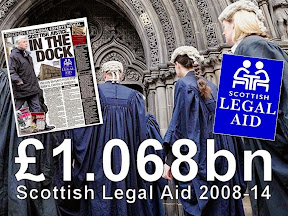



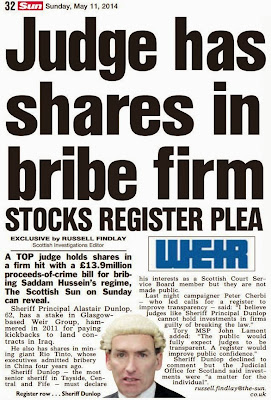











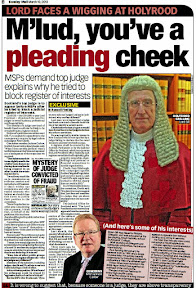
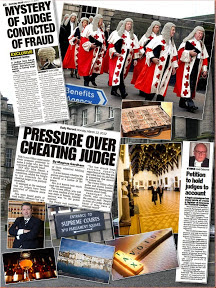
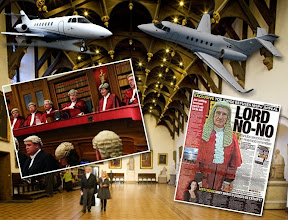


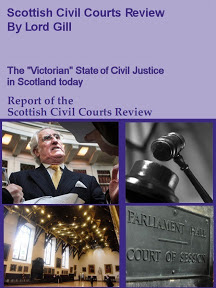
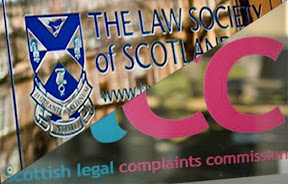



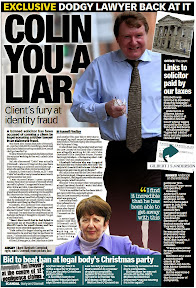
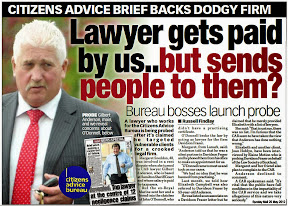



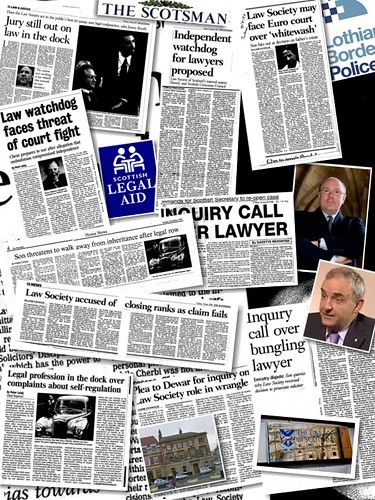




You must be logged in to post a comment.